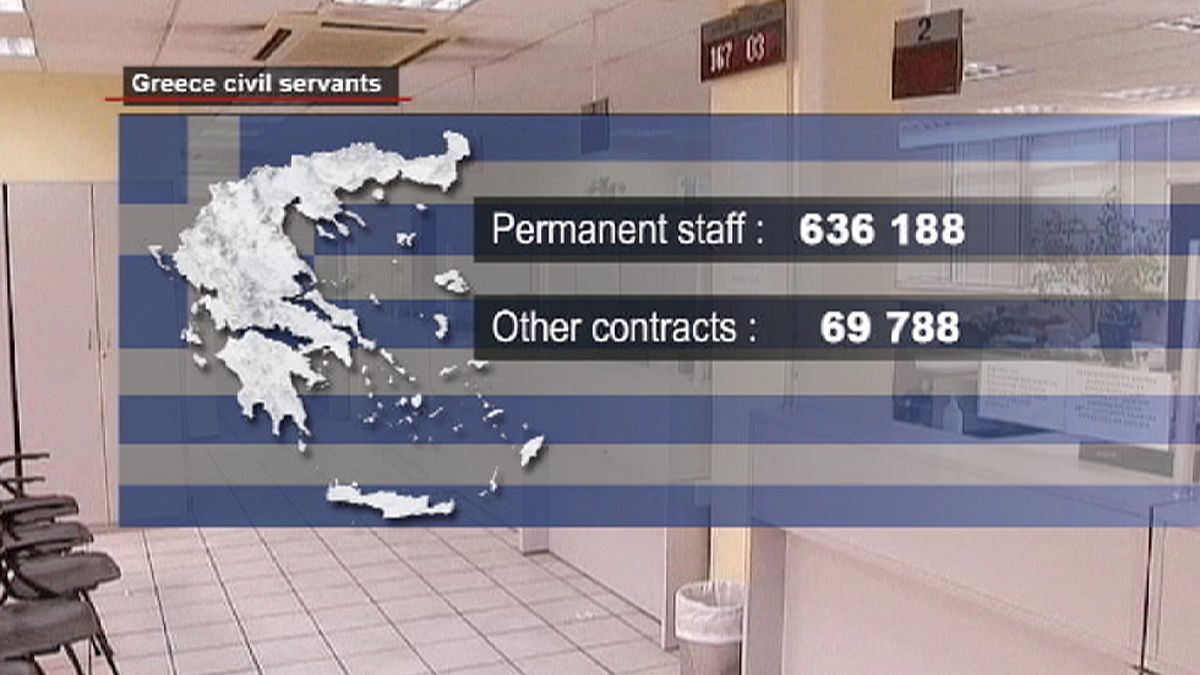Greece is far from the only country in the world where public sector workers make up a large part of the total workforce.
But its fiscal management and the economic conditions of the past several years have proven that Greece is one of the most dysfunctional countries.
It is now being forced to make many of its civil servants walk the plank, hoping this will lighten the ship and help prevent it from sinking.
With pensioners, civil servants are the main group facing pain: salary cuts, suppression of traditional paid days off and a raising of their retirement age above 50.
Kostas Tsikrikas, President of ADEDY, the civil servants’ federation, said: “The workers cannot take any more of these tough economic measures. The have been suffering for the past 22 months. We have already lost 15% of our spending power. This is not contributing to an exit to the crisis, but making it worse.”
Greece’s working population is around five million.
The people who receive their pay packets from the government easily number more than 700,000 – from administrators to secretaries, to soldiers and electricians in the public utility company.
Its bailout creditors say that is simply not sustainable.
A report for national reform just out gives the first precise count: 636,188 public sector workers with permanent contracts, and 69,788 employees in it with other types of contracts.
Athens has promised to lay off 150,000 of them in the next four years, to shrink the payroll.
Greece will need a leaner, smaller force of civil servants to do the same work as before, only better, notably in the finance ministry.
If it is ever going to make a dent in its colossal sovereign debt, it must wrestle down tax evasion, which is the number one cause of lost state revenue.
In January, the government published a list of more than four thousand Greeks whose unpaid tax bills totalled 15 billion euros.
Keen eyes all over Europe are watching to see if politics is truly the art of the possible.
euronews discussed the challenges with Panagiotis Karkatsoulis, a top public administrator in Athens and a key advisor to the EU’s Greece Task force.
Nial O’Reilly, euronews: Whatever happens in Greece politically, reform of the Greek state will remain a necessary and Herculean task.
Even if Greece were willing to comply with the EU reform demands, can they be achieved in the timescale given?
Panagiotis Karkatsoulis: It’s something very necessary, and I don’t know what is going to happen during this month, however, the reforms in public administration are very necessary, and no other change economic or financial can be sustained without such changes.
euronews: So what’s the priority, what for you would have the most immediate impact? Fiscal reform?
Karkatsoulis: What’s missing is a strategy where the state, the Greek state, is going to be in the near future, let’s say after one or two years. So the Greek state is in deep crisis as far as its functionality is concerned. What it is doing, it is doing very badly. Performance is very low. What it is doing is extremely expensive.
On the other hand, the last two years we have been operating under the MOU, [memorandum of understanding]. We haven’t seen any concrete plans, any concrete steps on how to change the situation, only measures here and there, very partially, no complete strategy, and the result is extremely poor for the time being.
It’s a political issue, but is it also a culture issue, because corruption and inefficiency in the Greek system is so deeply rooted its seems part of the culture, how do you go about the changing that culture.
Listen, I understand it’s a cultural issue, that certain attitudes have been developed in certain areas where there is no control, or only a few legalistic controls; for this [change] to happen, it needs a complete policy, and a very solid basis of commitment on behalf of the parties that are ruling. It needs a lot of effort and very coordinated actions.
euronews: You’ve recently been voted the ‘world’s best civil servant’ by an American institute [best government official, by the American Society for Public Administration]. If you can achieve that accolade, surely there’s hope for your compatriots. Let me ask you this question: are the current stereotypes about the Greeks demoralising people there?
Karkatsoulis: Of course there are stereotypes, [but they are] ideologically burdened, I might say. The real fact is that there are many people who are trying to do their best in the public service and the state is still alive, is still vertical, it’s working because of these civil servants.
On the other hand, I understand that we cannot talk about changes, we cannot talk about ‘big bang’ changes, if we don’t have the politicians with us, if we don’t have a political commitment and a parliament that expresses its will to pass certain regulations in this and that.
From that point of view, I understand there is a problem, and the sooner the political issue is solved, meaning to have a sustainable government, the better for the civil service.
